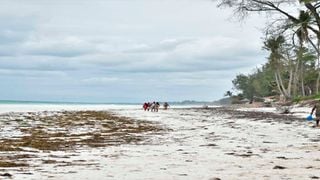
A handful of local tourists stroll along Diani Beach on June 8, 2021. The hospitality industry, which is on its deathbed, is trying to survive with domestic tourists.
| Wachira Mwangi | Nation Media GroupNews
Premium
Tourism faces valley of death as pandemic bites
For years, tourism was the bedrock of the coastal region’s economy, employing thousands and supporting secondary sectors. But this changed last year when Covid-19 struck.
Bed occupancy in Coast hotels is under 40 per cent, meaning that a hotel with about 200 rooms is getting an average of 80 visitors on its luckiest days.
Some beach hotels even go without visitors for days, a stark contrast to their heydays when they would be fully booked.
Since coronavirus struck Kenya last year, the industry has been facing endless hurdles. In 2020, hotels sent a majority of their staff on unpaid leave. When some of them were recalled, they were given pay cuts as the hotels lacked enough money to operate their businesses and pay employees.
Last month, in an ugly turn of events in Diani, employees at Kaskazi Beach Resort in Kwale forcibly dragged the general manager over the tarmac to the main gate as they demanded their unpaid salaries.
The agitated workers left Chris Indenche, who later claimed that he too had not been paid by the four-star hotel, with injuries.
Hotel operators’ hopes were raised when Covid-19-related movement restrictions were lifted in May.
The facilities are now banking on conferences that organisations have started holding and holidays by Kenyans who want to enjoy their time at the Coast.
Closed down
Kenya Tourism Federation Chairman Mohammed Hersi said the industry is still ailing but its fortunes are improving.
“Sometimes last year, the tourism industry was in the ICU, then it moved to the HDU and now we are still there but about to move to the normal wards,” he said.
He added that most hotels are now in ‘survival mode’, saying many are not operating but are also struggling not to shut down.
“The worst thing that any hotel can do now is to close down because out of sight is out of mind. They had better struggle but ensure that they have not completely closed down,” Mr Hersi said.
This optimism, however, contradicts what other players in the industry are saying. The Kenya Association of Hotelkeepers and Caterers Coast Executive Sam Ikwaye said several hotels that closed last year are yet to reopen. The most affected are those in Diani and Watamu as they are predominantly leisure destinations.
The association has about 80 members in Kwale, Kilifi, Mombasa, Lamu, Amboseli and Tsavo that cover the Coast region.
“Some hotels have permanently closed because they do not have cash. Mombasa has chances of survival because most of the visitors are coming for either leisure or business. The conferences are saving Mombasa,” he said, , blaming the dwindling business on containment measures imposed by the government such as the ban on night travel.
Explaining the low numbers of visitors, he said the industry is in its low season — every year between March and July.
“Many people are still holding onto their money waiting for the perfect time when schools will be closed and there will be no rains in the Coast region so that people can travel to enjoy the sun.”
Dr Ikwaye said low bed occupancy, which he put at between 20 to 30 per cent, was a result of most institutions not holding conferences or meetings as they used to.
Coast Hotels Working Group Chairman Husnain Noornani said Mombasa is lucky because it depends on meetings, incentives, conferences and exhibitions (MICE) tourism, which is being boosted by various government agencies holding their conferences or team-building activities in the facilities.
This experience is different from that of other destinations in Lamu, Malindi and Watamu that mostly depend on international tourists.
Hoteliers are now pegging their hopes on local tourists, reducing prices to fit the local market, but this does not bring in enough money to keep establishments running.
Mr Noorani, the Pride Inn Group managing director, said hotels have been forced to cut prices in order to keep visitors coming.
“A superior room that cost Sh12,000 now goes for Sh9,000 for a single bed at Pride Inn Paradise.”
He added that they have been offering special discounts such as a visitor spending three nights at the hotel and getting one free, among other incentives for the local market.
Tourism
This is even as some hotels have failed to pay their workers and settle other bills.
“It is a difficult season for the industry. In as much as we appear to have a lot of money, somebody must take overdrafts to maintain their place and pay bills such as water and electricity. It is expensive to maintain a big hotel when you just have a few visitors,” Dr Ikwaye observed.
Although the whole country is reeling from the downturn in tourism, Nairobi remains the most affected destination, with most of its hotels remaining closed.
Mr Noorani said this is because of the confusion about quarantines for arriving international visitors.
“That is the main challenge because no clear directions have been given by the government. They should give clear information for confidence to encourage MICE travellers,” he said.
But he applauded the Kenya Tourism Board for their Magical Kenya campaign that is encouraging local tourists to visit the Coast and many other destinations around the country.





